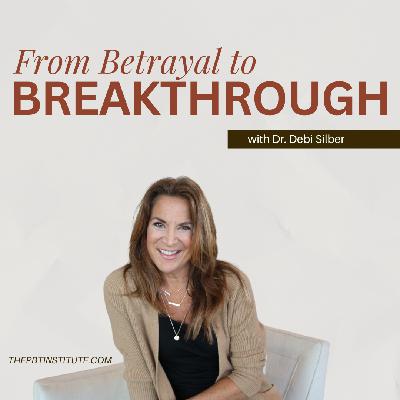446: Addiction and Betrayal: Breaking the Cycle of Enabling, Denial, and Despair
Description
In this deeply insightful episode, Dr. Debi Silber sits down with addiction expert Amber Hollingsworth to explore the complex intersection between betrayal and addiction—and the impact it has on partners, families, and loved ones.
Amber, who grew up in a family affected by addiction and went on to dedicate her career to helping families heal, shares raw and eye-opening truths about how addiction patterns form, why partners often become "the villain" in the addicted person's story, and how to strategically navigate the balance between compassion and boundaries without losing yourself in the process.
Together, Debi and Amber unpack how betrayal shows up through addiction—whether it's substances, behaviors, or emotional disconnection—and what it takes to stop enabling, break the cycle, and create the conditions for real recovery.
🧩 Key Topics Covered:
-
Amber's personal story of growing up in an addicted family and how it shaped her life's work.
-
The hidden connection between betrayal trauma and addiction—and why family members often carry the deepest wounds.
-
Why partners of addicts often become "the villain" in the story and how to reverse that dynamic.
-
The psychology of enabling—and how to stop protecting your loved one from the consequences they need to face.
-
The painful balance between love and accountability: how to let them fall without losing yourself.
-
What it really means to "hit bottom" (and why you don't have to wait for it).
-
How empathy, not anger, activates the brain's learning center and creates the possibility of change.
-
How to stay grounded, maintain your boundaries, and heal your own betrayal trauma—even while someone you love is still struggling.
-
The difference between fast-track addictions (like cocaine) and slow-burn addictions (like alcohol or marijuana), and how each impacts relationships differently.
-
How "trickle truths" and hidden addictions re-traumatize betrayed partners over time.
-
Why self-care and detachment aren't selfish—they're essential for clarity, health, and long-term healing.
🧠 Key Insights:
-
"When you grow up around addiction, rebellion sometimes looks like choosing to live differently."
-
"You're not powerless. You can't control your loved one, but you can influence the system they're in."
-
"When you stop being the villain in their story, the world becomes the mirror that shows them the truth."</sp







